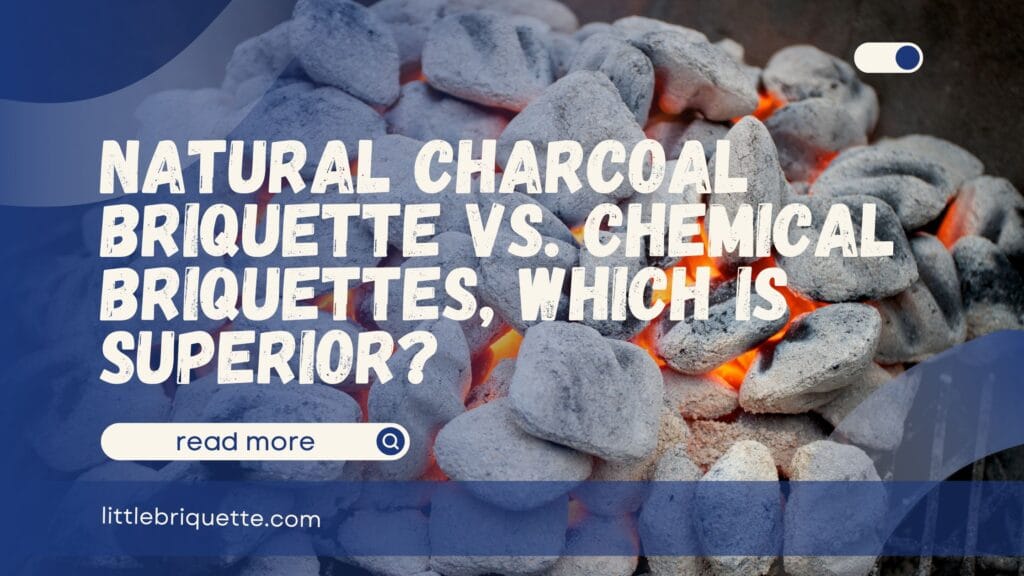When enjoying a BBQ or grilling at home, choosing the right briquettes is crucial for achieving perfect results. On the market, there are two main options that are often considered: Natural Charcoal Briquette and chemical briquettes. Each of these fuel types has distinct characteristics in terms of health, environmental impact, and burning quality.
Natural Charcoal Briquette are often regarded as more environmentally friendly and safer for health, while chemical briquettes offer convenience with a quick and stable burning process. So, which one is superior? In this article, we will review the differences between the two to help you make the best choice for a cleaner, healthier, and more delicious grilling experience.
What are Natural Charcoal Briquette?
Natural Charcoal Briquette are charcoal briquettes made from natural organic materials, such as wood dust, coconut shells, or other biomass products. Unlike chemical briquettes that contain additives, Natural Charcoal Briquette are made solely from natural raw materials and are processed without involving synthetic chemicals.
The production process begins by heating the organic materials through pyrolysis, a high-temperature burning process in an oxygen-limited environment, which produces charcoal. Afterward, the charcoal is finely ground, mixed with natural binders such as starch, and then shaped into briquettes. This process ensures that the final product is free from harmful substances and is more environmentally friendly.
The main advantage of Natural Charcoal Briquette is their minimal impact on both the environment and health. Since they do not contain harmful chemicals, these briquettes burn cleaner and do not emit the strong odors associated with chemical briquettes. Additionally, they burn more steadily and evenly, providing longer-lasting heat, making them ideal for long grilling sessions without the need for frequent briquette replacement. Without the presence of chemical additives, they are also safer for health as they do not release toxic fumes that could harm the respiratory system. Natural Charcoal Briquette are the ideal choice for those who care about food quality and environmental sustainability.
Read Also: Effective Tips and Tricks for Using Briquettes for Gas Grill
What are Chemical Briquettes?
Chemical briquettes are a type of charcoal briquette made by mixing charcoal with added chemicals, such as synthetic binders and oxidizing agents, to accelerate the burning process. These chemicals are designed to ensure that the briquettes ignite quickly and burn steadily within a relatively short period.
The composition of chemical briquettes typically includes substances like sodium nitrate or potassium nitrate, which act as oxidizers, along with other binding materials that make the briquettes denser and easier to arrange. While they offer convenience in use, chemical briquettes often produce smoke and unpleasant odors when burned, which can negatively impact the cooking or grilling experience.
The main advantage of chemical briquettes is their ease of use and fast burning. These briquettes are easy to light, burn quickly, and generate stable heat in a short amount of time, making them ideal for those seeking high efficiency without complex preparation.
However, a major drawback is their impact on health and the environment. The smoke produced contains harmful chemicals, and the odors emitted are often unpleasant, affecting both the people using them and the surrounding environment. Some of the chemicals used in the production of these briquettes pose health risks, as they can be inhaled and cause respiratory issues. Additionally, the residues from burning chemical briquettes can pollute the air and soil, making them a less environmentally friendly option.
Comparison of Advantages and Disadvantages
When choosing between Natural Charcoal Briquette and chemical briquettes, several important factors need to be considered, especially their impact on health, the environment, burning quality, as well as price and availability. Each type has its own set of advantages and disadvantages that will influence your cooking experience. Let’s take a closer look at the comparison of their strengths and weaknesses across these key aspects.
Impact on Health

Natural Charcoal Briquette do not contain harmful chemicals that could be inhaled during the burning process. Made from organic, natural materials, these briquettes burn cleaner, producing less smoke and no harmful substances. This makes them a safer option for health, especially in the long run.
On the other hand, chemical briquettes often contain additives like sulfur, petrochemicals, or synthetic binders. When burned, these substances can release hazardous smoke containing chemical compounds that affect air quality and pose risks to respiratory health, especially for those exposed to them for prolonged periods.
Impact on the Environment

Natural Charcoal Briquette are more environmentally friendly as they are made from natural materials that decompose more quickly after use, without polluting the soil or air. The combustion residue from these briquettes does not contain harmful chemicals that could damage ecosystems.
In contrast, chemical briquettes often contain synthetic chemicals that are difficult to break down and can pollute the environment. The burning process generates harmful particles that can contaminate the air, soil, and water, leaving a worse ecological footprint compared to natural charcoal.
Burning Quality

Natural Charcoal Briquette offer cleaner and more stable combustion, producing little smoke and leaving no unpleasant odor or taste on the food. This is crucial for those who prioritize the flavor and aroma of grilled food.
On the other hand, although chemical briquettes are easy to light and provide stable heat quickly, they often produce smoke that can be bothersome and emit odors that can taint the taste of the food. The chemical taste from the combustion residues can also negatively affect the overall cooking experience.
Price and Availability

Chemical briquettes are more affordable and widely available in the market, especially in large retailers or online stores. Although they are cheaper, the environmental and health costs of chemical briquettes often become an important consideration.
Natural Charcoal Briquette, on the other hand, are generally more expensive than chemical briquettes due to the more natural and eco-friendly production process. The higher production costs make them more expensive to purchase, but many consumers prefer them because of the health and environmental benefits they offer.
Read Also: How to Use Charcoal Briquettes for Effectively Barbecue
So, Which One is Superior?
If you prioritize sustainability, health, and the quality of your food’s flavor, Natural Charcoal Briquette are clearly the superior choice. With cleaner combustion, free from harmful chemicals, and minimal environmental impact, these briquettes provide a healthier and more eco-friendly cooking experience.
However, if convenience and quick burning are your main priorities, chemical briquettes could be a temporary solution, though they come with trade-offs. Chemical briquettes offer the ease of lighting a fire quickly and efficiently, but their health and environmental impacts—such as harmful smoke and unpleasant odors—make them less ideal for long-term use.
So, based on the explanation above, you can consider using charcoal coconut briquettes, which are natural and made from carefully processed coconut shells from Little Briquette. You can easily make a purchase through the contact number provided here for a perfect and delicious cooking result.

